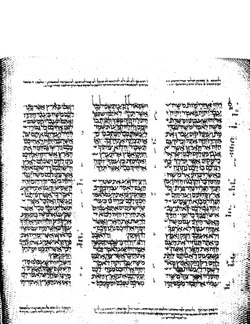Caleb's inheritance (14:6–15)
Before the allotment for the tribe of Judah, a special grant of land is given to Caleb, who (with Joshua) had dissented from the bad report of first spies (Numbers 13:30–33; cf. Numbers 32:12), and thus for his faithfulness was promised a possession of his own (Numbers 14:24; Deuteronomy 1:36). The land Caleb requested was in the area of Hebron (verse 12), within the territory soon to be allotted to Caleb's tribe of Judah. In his speech of the request Caleb emphasized his vigor into old age (cf Moses; Deuteronomy 34:7), as also a part of the promise to him (Numbers 26:65), because of his trust in YHWH, that he was not afraid of the Anakim, the gigantic people who scared Israel at first (verse 12; cf. Numbers 13:22, 28, 32–33).
Verse 10
- And now, behold, the LORD has kept me alive, just as he said, these forty-five years since the time that the LORD spoke this word to Moses, while Israel walked in the wilderness. And now, behold, I am this day eighty-five years old. [16]
A time calculation is embedded in this verse: Caleb the son of Jephunneh was 40 years old when he received the promise (after coming back as one of the 12 spies; verse 7), and 45 years have passed since then, so he is 85 years old at this time. According to Sebachim 118b, the promise in Kadesh-barnea was given 2 years after the Exodus from Egypt, so within 40 years of wandering, 38 years have passed until the crossing into Canaan (Deuteronomy 2:14). Therefore, now (45 years after the promise) seven years have passed which comprise the period of the conquest of Canaan.
Verse 13
- And Joshua blessed him, and gave unto Caleb the son of Jephunneh Hebron for an inheritance. [18]
- "Hebron : this city plays an important role in the history of Israel until, beginning with the burial of Sarah, the wife of Abraham there (Genesis 23:1–7) and continuing after the conquest with David reigning as king first from this city (2 Samuel 5:3–5), but in particular in this verse Hebron becomes the first place in the land of Canaan ("Cisjordan") to be allotted, and this is Joshua's first act of allotment (thus completely assuming the mantle of Moses). The actual conquest of the city by Caleb is recorded in the next chapter (Joshua 15:13–14).
This page is based on this
Wikipedia article Text is available under the
CC BY-SA 4.0 license; additional terms may apply.
Images, videos and audio are available under their respective licenses.


